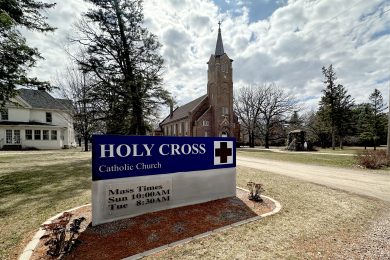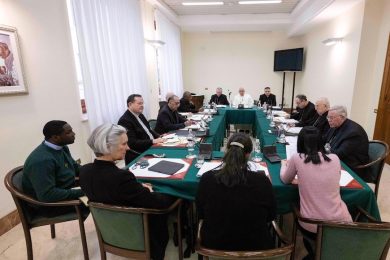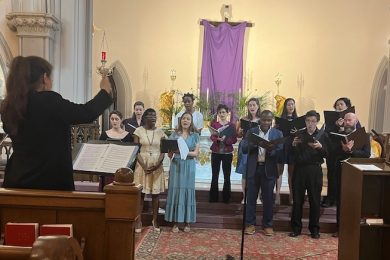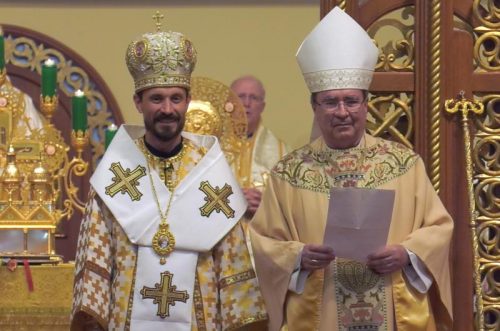PARMA, Ohio (CNS) — Slovak Bishop Milan Lach took his new post as apostolic administrator of the Byzantine Catholic Eparchy of Parma wanting to encourage and unify Byzantine Catholics of the eparchy in faith.
The eparchy’s clergy and faithful welcomed Bishop Lach during a Divine Liturgy July 21.
The 43-year-old Jesuit was the auxiliary bishop of the Archeparchy of Presov, Slovakia, at the time of his appointment June 24. Ordained a priest in 2001 and a bishop in 2013, Bishop Lach is the first European-born bishop to oversee the Eparchy of Parma since its founding in 1969, though he is the second European bishop to be named to the United States this year.
Ukrainian Catholic Bishop Benedict Aleksiychuk, former auxiliary bishop of Lviv, Ukraine, was named to head the Ukrainian Catholic Eparchy of Chicago in April.
Archbishop Christophe Pierre, apostolic nuncio to the United States, read the Vatican decree of Bishop Lach’s appointment during the July 21 liturgy at the Cathedral of St. John the Baptist in Parma. Byzantine Catholic Archbishop William C. Skurla of Pittsburgh, who preceded Bishop Lach as apostolic administrator for 14 months, was the celebrant.

Upon Archbishop Pierre’s introduction of Bishop Lach, the more than 300 people in the congregation responded with a standing ovation and the traditional Eastern Christian hymn, “God Grant You Many Years.”
“You will enjoy his presence,” the nuncio told the congregation. “A bishop is there to serve the people, to be with the people.” Citing Pope Francis, he said the role of bishops and priests is to be “ahead to lead the people, behind to push them, and in the middle to be with them.”
In an interview after the liturgy, Archbishop Pierre commented on the contribution European bishops can make to the U.S. church.
“It’s always good to have people coming from a different experience. The diversity, and especially these people who are being sent, have been chosen for their capacity to (adapt) from one country to the other but also for their abilities,” he told Horizons, the newspaper of the eparchy.
“It’s also a sign, especially today, where there is a tendency to build some walls … (that) the church is always open. And I think it is a challenge to the church to remain what it has always been — universal,” he continued.
He said he thinks bishops from other countries “are also being sent to help us not to lose the missionary dimension, because a church that is not missionary is not the church.”
The appointment drew international attention. Thousands of people logged onto the eparchy’s Facebook page to watch the livestream of the July 21 liturgy. By the end of the day, Facebook reported about 19,000 views of the video; many were from Bishop Lach’s native Slovakia.
Bishop Peter Rusnak of Bratislava, Slovakia, as well as several Slovak priests, traveled to Parma to concelebrate the liturgy, alongside retired Bishop John M. Kudrick of Parma; Byzantine Catholic Bishop John S. Pazak of the Holy Protection of Mary Eparchy of Phoenix; and Romanian Catholic Bishop John Michael M. Botean of St. George in Canton, Ohio. More than 70 clergy, including three Orthodox priests, and religious attended.
Archbishop Skurla noted in his homily that the Byzantine Catholic Church in the United States was established by European bishops, priests and faithful.
“With excitement and enthusiasm … they started from nothing,” he said. “They built churches that we continue to use today.” He urged the faithful to “be gentle” with Bishop Lach as he adjusts to life in the United States. “We pray that his time here is fruitful,” he said.
At the reception that followed in the parish hall, dozens of people stood in line to shake hands with Bishop Lach, speak with him briefly, and take photos.
In an interview after the liturgy, Archbishop Skurla described Bishop Lach’s appointment as the pope’s decision to “share a little bit of the Jesuit charism with Parma,” to “reconnect with the Slovak churches in Europe and also to have someone who would be able to go back to the meetings in Europe,” which he said was “a good plan.”
Slovakia is a “very spiritual country,” and this appointment also could help to share this richness and bring about “a revitalization” of the eparchy, he said.
In an Italian-language phone interview five days after his appointment, Bishop Lach said he wanted to encourage and unify Byzantine Catholics of the eparchy in faith. Though surprised by the appointment, he was eager to follow the will of God, he said. As a Jesuit, he added, he was formed for 18 years to go wherever the pope were to send him.
Bishop Lach said he was aware that some people were skeptical about his appointment, as they were perhaps expecting an American cleric.
“We’re one church,” he said. “A church is not an institution of nationalities. We are brothers and sisters in Jesus Christ above all else. In Christ, as St. Paul says, there is no Greek, nor Jew, because we are all united in Christ.
“There are those who would like to create divisions. I’m not coming to divide … Rather, I’m coming to unify everyone as a pastor, as a father,” he said.
Bishop Lach described his pastoral approach as “being human, being close to the people.”
“I am one who, before making a decision, will listen, pray, reflect and perhaps only after propose a solution. Things may not happen quickly, but first I want to know how things really are,” he said.
“I am convinced that the Christian life and faith are lived in the parish and, above all, in families, where daily life happens,” he said, adding that faith, family and marriage are “under strong attack.”
“The attack on life is a disgrace for Christians,” he said. “That innocent life, from conception is threatened up until the end of life with euthanasia … is a dishonor to the human being.”
He said he appreciated the distinctness of “American culture developed in freedom,” adding that the church within the culture is to “collaborate with everyone, even with those who perhaps hate us.”
In this era of globalization, hope and encouragement in the faith are needed today in the United States, as much as in Europe, he said.
He also said he is not as much of a foreigner as some people might think. His maternal great grandfather immigrated to the United States and his grandfather was born and baptized in Oglesby, Illinois, within the present-day territory of the 12-state Eparchy of Parma. He visited the United States twice before his appointment. He speaks English and said he expects it to improve with time.
In an English-language in-person interview July 23, Bishop Lach repeated that his objectives were “to be attentive, to listen.” He said he is “open to every proposal” to help the faithful of the eparchy grow closer to God.
His “main interest” is to be close to the priests of the eparchy, as well as to the families of those priests who are married, “with all of their necessities, questions, challenges and so on,” he said.
The bishop said he would like to create “good conditions” for priests “to proclaim the Gospel, to be indeed pastors, to be shepherds, to be indeed fathers.” Tasks in management and finance, which can be carried out by laypeople, are secondary to the priesthood, he said.
While he believes he needs to learn more about American culture, “I think that the heart of people is the same everywhere,” he said.






















